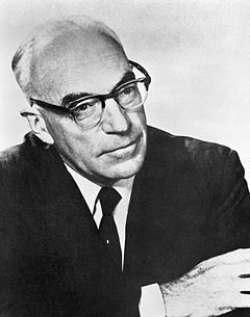Sir John Eccles

- Born
- 27 January 1903
- Died
- 2 May 1997 (age 94)
Sir John Eccles was a renowned Australian neuroscientist. His research on the role of synapses in the nervous system has been instrumental to our understanding of the transfer of signals across nerve cells and won him the 1963 Nobel Prize.
Eccles was born in 1903 in Melbourne, Australia. Both of his parents were teachers, so perhaps this instilled his early passion for education. In 1925, following his graduation from Melbourne University with a first class honours in Medicine, Eccles moved to Magdalen College, Oxford to study under the eminent neurophysiologist Charles Scott Sherrington.
Eccles continued to collaborate with Sherrington until 1937, in this time researching how signals are transmitted through the nervous system using synapses, the junction between two nerves or neurones. Although very primitive compared to modern approaches, Eccles was able to take advantage of newly developed techniques including electrophysiology – the study of electrical signals in the nervous system.
In 1937 Eccles returned to Australia to become the director of a research unit in Sydney. It was during this period, and subsequently while working at the University of Otago in New Zealand, that Eccles conducted the experiments that successfully monitored the electrical signals that carried information between nerves. This work, in collaboration with Alan Hodgkin and Andrew Huxley, won them the Nobel Prize in Physiology or Medicine in 1963.
Eccles studied the signals transmitted across gaps, called synapses, between adjacent nerve cells. Two types of signal can be detected at the synapse: those that cause the adjoining nerve to be excited and those that result in inhibition. Eccles used the new microelectrode technology to experiment with these different signals, demonstrating the inhibition and excitation of the different currents in real neurons.
Although Eccles was incorrect in his initial prediction that the transmission across synapses was purely electrical, his work in the area led others to pursue the issue and discover the role of chemicals in the transmission process. Eccles worked with the renowned German neuroscientist Bernard Katz to discover the role of the chemical transmitter acetylcholine, a pivotal breakthrough considering that acetylcholine is responsible for controlling the movement of almost every muscle in the body.
The more we discover scientifically about the brain... the more wonderful do the mental phenomena become.
John Eccles, How the Self Controls Its Brain, 1994
Following his Nobel Prize, Eccles moved to America and became increasingly interested in philosophy. He collaborated with the philosopher Karl Popper and published a number of books various topics, mainly concerning the role of the brain and the concept of the ‘self’.
After retiring in 1975, Eccles moved to Switzerland, where he continued to study the philosophy of the mind until his death in 1997. The pioneering work that Eccles performed at the Australian National University was recognised in the naming of the Eccles Institute of Neuroscience, which opened at the university in 2012.
This profile was written by a Biology: Changing the World volunteer.



